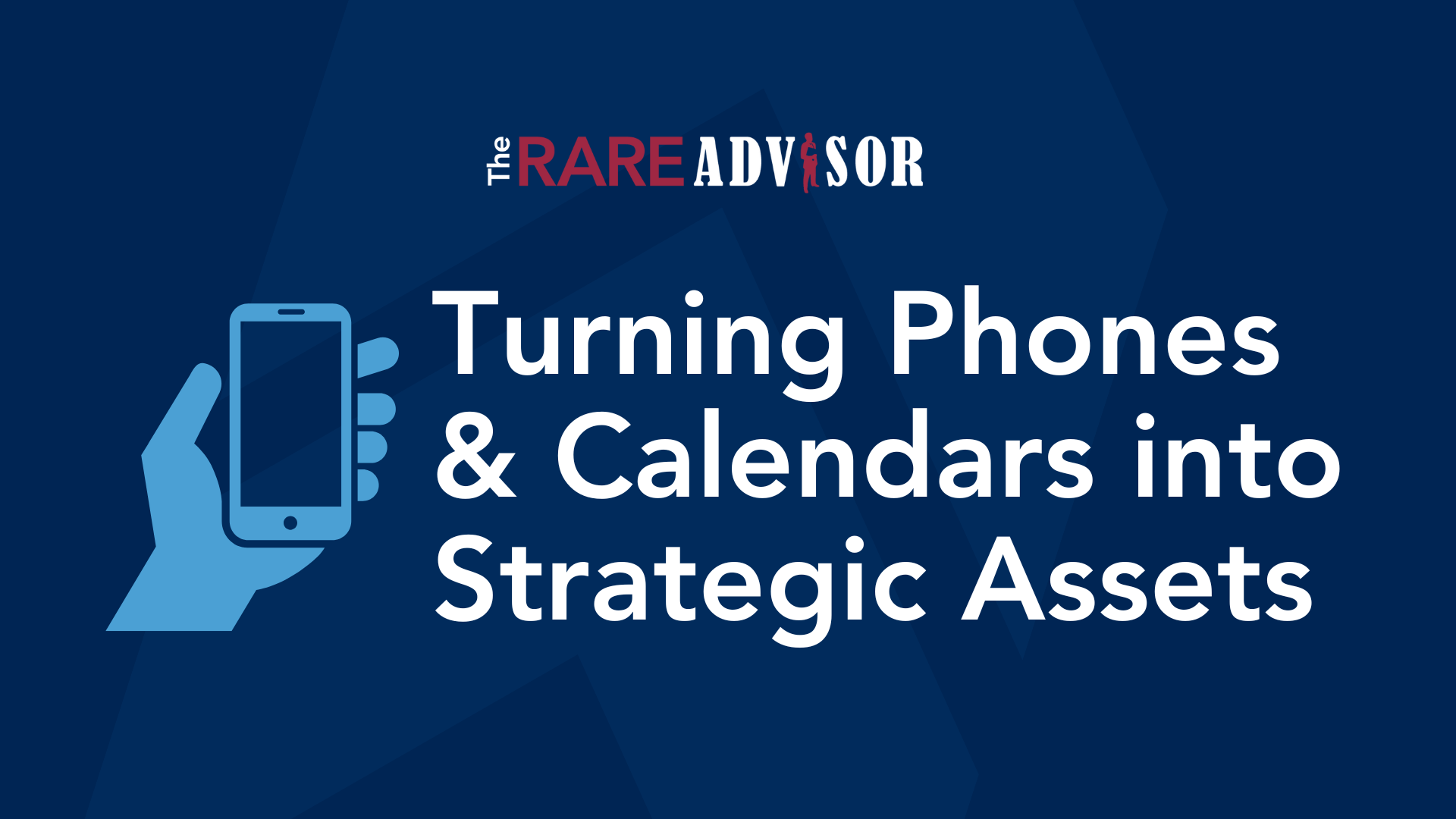The Power of Planning: Why Financial Advisors Need a Yearly Game Plan

If anyone knows the power of advice and the importance of planning, it’s a knowledge-for-profit professional. Picture this: You're about to embark on a road trip to a destination you've never been to before. Would you set off without a map or GPS? Probably not. Just like that road trip, running a financial advisory business without a plan can leave you feeling lost and unsure of where you're headed. That's why creating a yearly plan is crucial for financial advisors.
Your plan has to be an ongoing, living process. It’s not ‘once a year and done’. It won’t surprise you that one of the biggest blind spots for financial advisors and small business owners is the lack of implementation of a strategy. Ideas are a dime a dozen. It is the implementation of an idea that sets it apart from everything else and brings it to life. A plan lets you implement efficiently.
Let's dive into why it matters and how it can make a significant difference in your business.
1. Clear Direction and Purpose
Imagine sailing a ship without a destination in mind – you'd drift aimlessly. A yearly plan acts as your North Star. It gives your business a clear direction and purpose. It defines your goals, whether it's increasing your client base, boosting revenue, or expanding services. With a plan in place, you'll know exactly where you're headed and why.
2. Prioritization
As a financial advisor, you're often pulled in multiple directions. A yearly plan helps you prioritize your tasks and allocate resources effectively. It lets you focus on what truly matters, ensuring that your efforts align with your long-term objectives.
3. Adaptability
The financial world is dynamic, with regulations, market conditions, and client needs in a constant state of flux. A yearly plan allows you to adapt and respond to changes effectively. When unexpected challenges arise, you can refer to your plan and adjust your strategies accordingly.
4. Financial Stability
Your business's financial health is paramount. A well-crafted plan includes budgeting and financial projections. It ensures you have the necessary resources to weather storms and seize opportunities, promoting long-term stability.
5. Client Retention and Growth
Your clients are the lifeblood of your business. A yearly plan lets you strategize on how to better serve your existing clients and attract new ones. It's a tool for building stronger, more enduring client relationships.
6.Efficiency
Identifying inefficiencies in your business is essential for growth. A yearly plan helps you streamline your operations by pinpointing areas for improvement. This not only saves time and resources but also enhances your overall service quality.
7. Motivation and Accountability
A plan can be an incredible motivator. It gives you a tangible target to aim for and celebrate when you hit your milestones. It also holds you accountable – if you deviate from your plan, you'll know it's time to recalibrate.
8. Measurement and Evaluation
"Measurement is the first step that leads to control and eventually to improvement." This quote by H. James Harrington perfectly encapsulates the importance of tracking progress. A yearly plan provides a baseline against which you can measure your success. It allows you to evaluate what worked and what didn't, guiding your future decisions.
Best Practices
- Schedule an annual planning session by setting a calendar reminder.
- Aim for the session to occur at the close of November or the start of December.
- Involve the entire team in this session.
- Consider holding the session off-site, incorporating both a business meeting and a social team-building component.
- Make use of an agenda, craft a calendar, and outline a budget to guide the planning process.
- Regularly review your plan, setting reminders at intervals such as weekly, monthly, and quarterly.
Conclusion
Creating a yearly plan for your financial advisory business isn't just a smart move; it's essential. It provides the roadmap you need to navigate the ever-changing landscape of the financial industry. Whether you're a seasoned pro or just starting out, a plan will help you steer your business toward growth, stability, and success.
Available Resources:
- Sample agenda
- Sample annual calendar
- Marketing budget tool
So, take some time to sit down, outline your goals, chart your course, and prepare for the journey ahead. With a well-thought-out plan in hand, you'll be better equipped to tackle the challenges and seize the opportunities that the coming year has in store for you and your clients.
If you're interested in learning more about how to implement Yearly Strategic Planning, we would be happy to schedule a one-on-one conversation.
Author Info

Allan Oehrlein is a Practice Management Consultant at USA Financial. With over 14 years of experience in Financial Services, Allan brings a...
Related Posts

Access by Design: Turning Phones and Calendars into Strategic Assets
In this episode of The RARE Advisor, host Aaron Grady and practice management consultant Allan Oehrlein continue their discussion on time allocation by exploring what comes next: operationalizing structure across the entire advisory team. They break down why the phone is the “front door” to the firm and the calendar is the “engine room,” and how elite practices use standardized phone scripts, the strategic power of the word “unavailable,” intentional scheduling rules, and team empowerment to build consistency, capacity, and trust. Aaron and Allan outline how designed access—not unlimited access—creates scalability and a stronger client experience, while reducing reactivity, burnout, and advisor bottlenecks. They also offer practical challenges advisors can implement immediately to redesign their phone and scheduling processes in ways that elevate both team culture and enterprise value.

The Psychology Behind Your CTA: Why Prospects Don’t Click “Book a Call”
In this episode of Financial Advisor Marketing Playbook, Mark Mersman breaks down the real psychological barriers that stop prospects from clicking “book a call” on an advisor’s website—and how small language and design changes can dramatically improve conversions. You’ll learn practical, compliant fixes including softer CTA language, expectation statements, empathy‑based messaging, simplified design, and reassurance techniques that lower emotional friction. If you want a website that encourages prospects to take the first step confidently, this episode delivers actionable guidance advisors can implement immediately.

How Advisors Can Get 10 Hours Back Every Week
In this episode of The RARE Advisor, host Aaron Grady and USA Financial Pareto coach and Practice Management Consultant Allan Oehrlein dive into time allocation as a core lever for advisory success. They unpack the biggest time drains—email, unsolicited calls, and open-door interruptions—and lay out a practical framework for calendar rebalancing that starts with personal time, management time, client appointments, dedicated communications windows, “work on the business” time, and high-impact growth activities. With real-world stories showing how advisors shift from reactive days to structured weeks (and even reclaim Fridays), Aaron and Allan share easy-to-implement tips: color coding calendars, scheduling buffers, daily huddles, and call/appointment protocols. If you’re ready to audit your calendar, define your ideal week, and create structure that truly liberates your practice, this conversation is your next step.

Access by Design: Turning Phones and Calendars into Strategic Assets
In this episode of The RARE Advisor, host Aaron Grady and practice management consultant Allan Oehrlein continue their discussion on time allocation by exploring what comes next: operationalizing structure across the entire advisory team. They break down why the phone is the “front door” to the firm and the calendar is the “engine room,” and how elite practices use standardized phone scripts, the strategic power of the word “unavailable,” intentional scheduling rules, and team empowerment to build consistency, capacity, and trust. Aaron and Allan outline how designed access—not unlimited access—creates scalability and a stronger client experience, while reducing reactivity, burnout, and advisor bottlenecks. They also offer practical challenges advisors can implement immediately to redesign their phone and scheduling processes in ways that elevate both team culture and enterprise value.

The Psychology Behind Your CTA: Why Prospects Don’t Click “Book a Call”
In this episode of Financial Advisor Marketing Playbook, Mark Mersman breaks down the real psychological barriers that stop prospects from clicking “book a call” on an advisor’s website—and how small language and design changes can dramatically improve conversions. You’ll learn practical, compliant fixes including softer CTA language, expectation statements, empathy‑based messaging, simplified design, and reassurance techniques that lower emotional friction. If you want a website that encourages prospects to take the first step confidently, this episode delivers actionable guidance advisors can implement immediately.

How Advisors Can Get 10 Hours Back Every Week
In this episode of The RARE Advisor, host Aaron Grady and USA Financial Pareto coach and Practice Management Consultant Allan Oehrlein dive into time allocation as a core lever for advisory success. They unpack the biggest time drains—email, unsolicited calls, and open-door interruptions—and lay out a practical framework for calendar rebalancing that starts with personal time, management time, client appointments, dedicated communications windows, “work on the business” time, and high-impact growth activities. With real-world stories showing how advisors shift from reactive days to structured weeks (and even reclaim Fridays), Aaron and Allan share easy-to-implement tips: color coding calendars, scheduling buffers, daily huddles, and call/appointment protocols. If you’re ready to audit your calendar, define your ideal week, and create structure that truly liberates your practice, this conversation is your next step.

